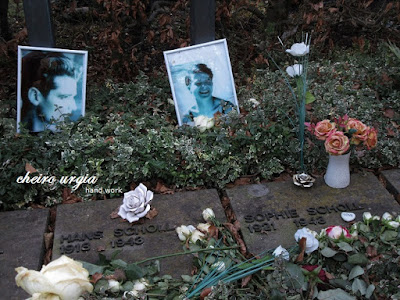After
a comfortable phase of "getting used to new surroundings"
and a rather fun twist that made me end up in the surgical
department, it was time to hit a major crisis.
Because
there's no crisis like when you suddenly go from "The student
has to perform 10 venipunctures during their internship" to
"These are today's blood test tubes, go get the blood and send
it to the lab", from "Could you make an ECG" to "Tell
me what it says", and from nothing but status survey and history
to managing a whole ward of patients on your own.
Because
honestly, what's the use of learning exam questions by heart when
your graduates literally can't take a blood sample, let alone assess
a wound, rinse it properly and create a wound dressing that would fit
the needs and circumstances.
Because obviously, other countries and institutions seem to take the practical skills of their students seriously.
Removing
drainages independently on a daily basis? Forget it. As a student,
your job is to stand in the corner and collect autographs for
procedures you've never seen, let alone
done.
To
be fair, there are exceptions, but to say that University has
prepared me for real life would be a gross overstatement. In the end,
if you're lucky, you might end up having a really good mentor, but
again this means the skills you develop will depend on pure chance
rather than a reasoned system.
No
wonder that after my first "real" day of work in Germany, I
just wanted to go back to my dorm, hide
under the bedcovers, cry my eyes out and never come out again. Or,
optionally, to go home for good even if I never see my Winter School
fees again. Let him have Germany whoever wants to have it, I've had
more than enough and just want to get back to my comfort zone.
Looking back now, it is only thanks to my
wonderful German colleague that I didn't make a complete crash
landing.
But
slowly, after being thrown into ice cold water, I began to swim...
By
the second week, I thought I might actually be able to survive the
whole thing. There were still lots of situations that brought
me down to earth just when I was about to feel confident, but with
the proper guidance of colleagues and enthusiastic
young doctors, everything became bearable.
By
the third week, things began to feel like fun. While my wonderful
colleague left for another commitment, I got another, equally
wonderful and skilled colleague that took me under her wings like a
real mother hen.
The
daily routine became self-evident, and while working myself through
the rooms, I could silently laugh at my clumsy beginnings. With
even the most timidest requesting me to draw the blood and remove
their drainages, I was beaming from the inside out. When I ended up
being the mother hen instructing students who stopped by for their
one-week practice, it could easily lead to situations like, "You
know, I was afraid to imagine that a student would remove
my drainage."
"Well,
ma'am, I am a student."
When
it was time to change wards for my final week,
I took all my courage (now that I had it back!)
and asked if I could to stay. The entire department from
nurses to doctors, students, and patients became dear to me and are
now part of a wonderful winter school experience I wouldn't want to
miss. Ever.
The
downside of the whole story was, of course, a massive lack of time.
The intense nature of ward work plus our afternoon lectures made me
feel more and more exhausted, wondering what good can Munich's sites,
greenery, and events be to people who are obviously too busy to see
anything but their jobs? What is the purpose of a work-eat-sleep
lifestyle anyway?
Considering
the fact that we'd have to literally travel through the whole city to
get to the clinic, I'd have to get up an hour before the start of our
ward round – a horrible task for a non-morning person like me, and
torture in comparison to my Ljubljana routine where the time
difference between bed and clinic would be half of that.
Needless
to say, the time on the tube was just perfect for a precious morning
nap, and thanks to snacks available on the ward, I would usually get
my breakfast sometime between blood samples and wound care. When
I finished my tasks for the day in the late afternoon, I was often
too tired to even eat, let alone prepare something edible and get the
dishes done afterward. I tended to literally fall asleep on the tube
only to wake up just in time to exit and stop by in the supermarket
on my way home. And if it wasn't for Edeka's (super yummy) sushi
boxes that enabled me to perfect my time-management according to the
laws of "bring home-open-eat-go to bed",
I don't know how I would have made it.
I
guess my experience would not entirely apply to non-German speaking
students, who soon realized that a whole number of tasks which
included language wouldn't make sense to them and acted accordingly.
Looking back now, however, I wouldn't want to miss starting the day
with the morning conferences, and by no means skip any of the bedside
tasks I was assigned to, even if it often meant rushing directly to
the lectures afterward without a proper lunch. Because who needs
lunch if you can do ward work instead?
Due
to the busy schedule, however, I can say I literally missed spring
this year. The winter jacket became too warm to be worn at some
point, but apart from that, it was only in form of subtle roadside
signs like the growing amount of blooms and greenery that made me
realize nature must be moving on.
Luckily,
I had my free weekends which I used to discover my surroundings, even
though my mind was craving for sleep. Additionally, we were given the
opportunity to join a number of one-day trips that were organized for
international LMU students. And after all, how very strange would it
be to have spent a whole month in Munich without having seen a thing
in the city?
On
a long-term basis, I'm still not sure on whether I'd be able to live
the German way. I've definitely seen a lot and learned more practical
stuff than I have in my whole University career. I gained confidence
in my skills and abilities, and, most importantly, realized that my
language proficiency for German does include the emotional part, even
though I had severely neglected it since leaving High school.
Still,
the fact that I barely made it through the week even with no
household to run and no hobby to pursue (in my naivety, I actually
did bring a couple of crafting projects with me), made the idea of
literally living for the job only a very difficult one to imagine.
But
then again, Never say never. Who knows, maybe with an organized way
of life, a good time management and even a little fairy for the
housekeeping tasks, everything is possible. Even a healthy,
productive work-life balance.
All
in all, my Munich experience gave me a chance to realize how
different the world is outside the tiny place I began to call home,
that - as I see now - is more and more becoming a place of whining, a
generalized self-pity, bad organization, hatred, and stupidity.
Instead
of wondering why folks are leaving, one should start asking
themselves how come that anyone is still ready to work in conditions
like that? The only answers I can come up with are: either a mix of
desperation and a naive feeling of being able to cope, the
lack of an idea about what s offered elsewhere, or maybe just the lack of courage to find it out.
~
to be continued ~







































































